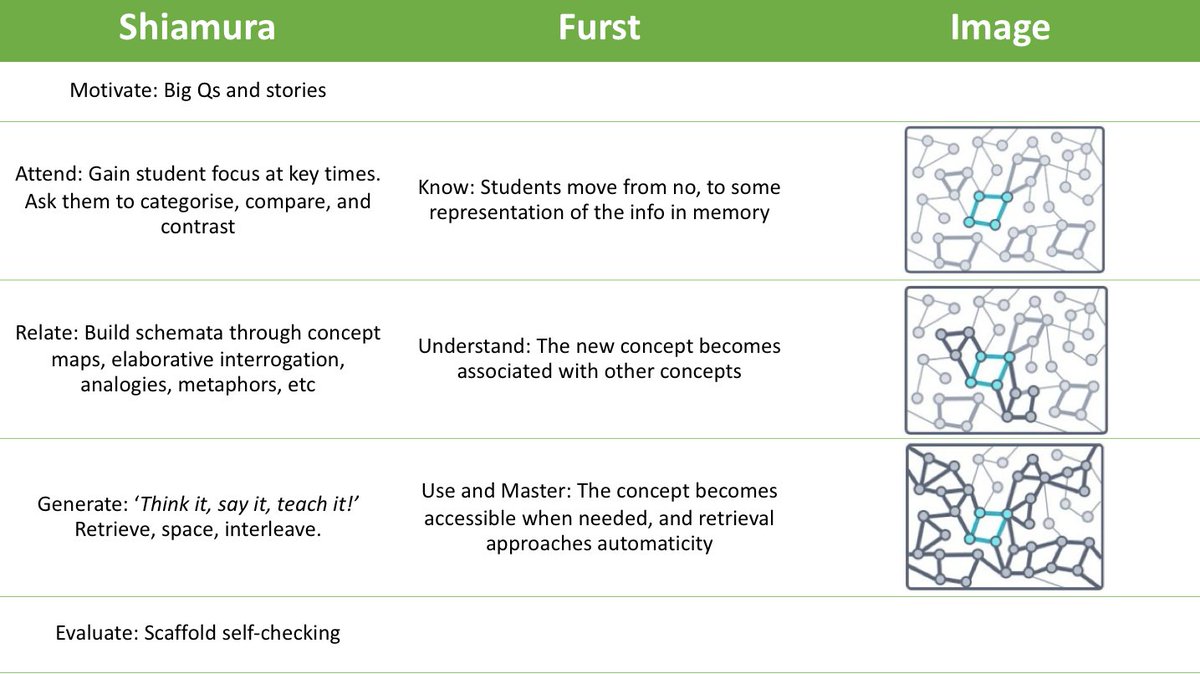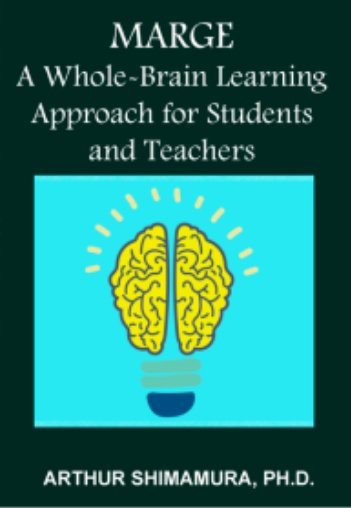It's the penultimate week of the public school year here in Melbourne, Victoria, and by the time you receive this email, all year 12 students (and their teachers!) will have received their results for the year. It's an exciting day!
T1 this week summarises some key takeaways from the fantastic ‘MARGE' booklet on memory that I shared a few weks ago.
T2 is Harry Fletcher-Wood building on my article from a few weeks ago entitled Implementation Intentions and action triggers: moving beyond ‘Well, make sure you do it next time’
T3 is a nice piece about combining different tools of teaching to approach simultaneous equations.
T4 is more on learning styles.
T5 is more from Harry Fletcher-Wood. A bit of a classic post this one.
I was really interested in T6 this week. A piece by Dan Willingham (cognitive scientist extraordinaire) about the costs and benefits of audiobooks vs. print.
T7 and 8 are some pieces on writing that English teachers will no doubt enjoy. I'm currently waiting for my copy of @JudithCHochman's The Writing Revolution in the mail. Can't wait!
T9 is a snippet from a great book I'm currently reading that's getting me thinking.
T10 an interesting concept.
Last week at a conference I ran a workshop with @mic_epstein and @nomadpenguin to encourage teacher blogging and teachers on Twitter. That was on Friday arvo and on Sat morning, by midday @SeanMaths4EAL had joined twitter, created a website, and written his first blog post! I wanted to share his first post here as a bit of a celebration. Also, the article I wrote last week ‘Managing Overwhelm: How do you curate and consume your education reading list?‘ was written to scaffold that conference session.
Thought shrapnel this week shares some Questions that I used to prompt discussion with the senior maths team this week. We reflected on the year, and did some planning for the year ahead.
Enjoy : )
(all past TOTs here), sign up to get these articles emailed to you each week here.
Motivate, Attend, Relate, Generate, Evaluate: Key takeaways from Prof. Arthur Shiamura's MARGE booklet. Via @teacherhead
Previously, I've shared the short booklet ‘MARGE' by Prof Arthur Shiamura. It's a booklet on memory and learning using an acronym for Motivate, Attend, Relate, Generate, Evaluate. I wanted to share some takeaways, as summarised by @teacherhead in

@HFletcherWood adding nuance and research on implementation intentions
Here's @HFletcherWood on implementation intentions. Adding some nuance and research to my blog on the same topic from a couple of weeks back. Love this ‘homework problem?' chart too! https://t.co/tQUZ49BWzZ pic.twitter.com/bYesv39FAU
— Oliver Lovell (@ollie_lovell) December 10, 2018
Using a worked example, an estimation question, and multiple representations in tandem, via @mpershan
‘Smoothing the path from simpler to more complex systems of equations' : using a worked example, an estimation question, and multiple representations in tandem! https://t.co/TFwNm0kxE3 via @mpershan pic.twitter.com/3GbWcfaHKx
— Oliver Lovell (@ollie_lovell) December 13, 2018
More reasons to abandon learning styles: Teachers and pupils do not agree on the pupils' preferred learning style
“An additional reason to abandon learning styles” – teachers and pupils do not agree on the pupils’ preferred learning style https://t.co/GW6sXQgEDi
— Oliver Lovell (@ollie_lovell) December 13, 2018
Better planning, better teaching, better learning (a template) via @HFletcherWood
Better planning: better teaching, better learning [a template] https://t.co/PxZigkyqpZ one of the classics. Highly usable, via @HFletcherWood pic.twitter.com/oGx39jn5H5
— Oliver Lovell (@ollie_lovell) December 9, 2018
What's better, listening to a book, or reading it? via @DTWillingham
Is Listening to a Book the Same Thing as Reading It? https://t.co/CgiEKsekeG via @DTWillingham. TLDR? They're both good. But you'll struggle to deeply process a dense text in audio form.
— Oliver Lovell (@ollie_lovell) December 9, 2018
Note: I later revised this tweet to ‘TLDR: both have their advantages, but audio-only makes it harder to pause, look up terms, and re-read, thus making it harder to process texts that impose a high cognitive load'.'.
Writing in Science: concluding the symposium, via @JudithCHochman
Writing in Science: Guest post by Hochman and Wexler. A wonderful conclusion to the ‘Writing in Science' symposium, convened by @Mr_Raichura. My copy of ‘The Writing Revolution' is in the post. Excited! https://t.co/LpnPxcfJYx
— Oliver Lovell (@ollie_lovell) December 8, 2018
Developing great writing, via @joeybagstock
This set of three posts on developing great writing by @joeybagstock provided much food for thought. https://t.co/JkX0y1Husb
— Oliver Lovell (@ollie_lovell) December 8, 2018
The tradeoff between validity and reliability, snippet from @Daisychristo's ‘Making Good Progress?'
A great point about the tradeoff between validity and reliability in assessments. Found in @daisychristo‘s ‘Making Good Progress?' pic.twitter.com/UZpJ7ojJby
— Oliver Lovell (@ollie_lovell) December 11, 2018
Are textbooks an intervention or a commodity? via @RobertSlavin
Are textbooks an intervention or a commodity? And what's their role in evidence based reform? Here's Robert Slavin on these stimulating questions. (not an amazing article, but I find the first distinction an interesting one) https://t.co/3PJIy9YTtK
— Oliver Lovell (@ollie_lovell) December 10, 2018
Welcoming a new maths blogger, @SeanMaths4EAL
Was excited to read this first blog post by @SeanMaths4EAL! A nice coincidence, he chose to blog about a session run by some of my colleagues from Sunshine College! Cc. @EduJodieparsons https://t.co/5UhZTqqtSc
— Oliver Lovell (@ollie_lovell) December 8, 2018
>>>THOUGHT SHRAPNEL: Questions to prompt an end of year conversation/reflection with your team members<<<
End of year conversations
As we’re coming to the end of the year, I’m keen to take stock with the senior maths team, get a clearer sense of how they’ve felt about this year, and ask them about how they feel we can improve things for next year.
This is something that I did last year in meeting time, but I’m keen to take a more in-depth approach this year and schedule a time to have a discussion with each teacher one on one.
Further to this, when Craig Barton interviewed me for the Mr. Barton Maths podcast, and I mentioned the four questions that I asked the senior maths team at the start of my time as Senior Maths HoD, Craig asked me something to the effect of ‘Could it have helped the teachers deepen their responses if you sent through the questions in advance in order to give them more time to think about it?’ I replied ‘Yes, good idea!'
And so, this week I set about trying to craft some questions that would lay some solid foundations for the year ahead. My initial set of questions were greatly improved by the suggestions of our Art HoD, Ben, so thanks for that Ben. And I'm excited that both Ben and our head of English have already used these questions (or a variant thereof) to have discussions with their teams. I include the Qs I used with my team in their original form, please feel free to modify and use, or to suggest how they could be improved.
I handed each member of the senior maths team the following on a printed A4 sheet. I have spoken to three staff so far, the discussions to 60, 20, and 14 minutes respectively. They were all very worthwhile conversations.
Please consider the following questions in preparation for a discussion with Ollie today/this week
This year, an overview
-On a scale of 1 to 10 – 10 being the best possible year you could have as a teacher, 0 being the worst possible year that you could have as a teacher – What score would you give this year and why?
Curriculum and handover documents
-Do you feel that the planning resources that you received at the start of this year were adequate for you to plan your teaching?
-Is there anything else that would have been helpful?
The use of meetings
-This year we have primarily spent our meeting time as follows: Discussing practice, reading articles (sometimes), discussing students at risk, working on projects such as PDPs/Pre- and post-testing/general admin. Do you feel that our meeting time has been well spent?
-Regarding how we have spent our meeting time, is there anything you’d change for next year? (Keeping in mind that we’re already planning to use the Dylan Wiliam Formative Assessment PD pack, feel free to comment on this plan also)
You and I working together
-In what ways (if any) do you feel I have supported you in this year?
-Are there any additional ways you feel that it would be helpful for me to better support you in your role?
-If I ask you to do something that you think isn’t a particularly good use of time, do you feel that you can express this to me, and do you feel as though I listen to your concerns and take them into account? I would value any examples of when I have, or haven’t, done this well.
-Is there anything else I can better do in terms of my leadership, or the way that we work together and communicate, that could be improved for next year?
Relationships with rest of the team
-On a scale of 0 to 10 – 0 being a highly antagonistic and conflicting team, and 10 being the dream team – where would you place our senior mathematics team, and why?
Department expectations
-This year, some of the norms and expectations of members of the senior maths team have been as follows:
- Use dropbox as location from which to work, and in which to store files
- Use the department markbook template as a basis for your markbook
- Store your markbook, or a link to it, in the ‘admin’ folder of dropbox
- Run a progress check every week in every subject
- Ensure that students complete a progress check reflection, based upon each of their progress checks
Is there anything you’d like to add or subtract from this list for next year? Why is that?
Student feedback protocols
-This year our student feedback protocol was to use the Student feedback form. We used this three times throughout the year and reviewed our results. Do you think this was a useful way to garner student feedback, or do you think an alternate option would be better? (If so, what would you like to do instead?)
-We didn’t have any formal ways to follow up on, or action, student feedback from these surveys this year. Is this something you’d like to change for next year?
Observations
-Do you feel that observations and feedback is a way that does/could help you to be a better teacher?
-When it comes to observations of your lessons, what is important to you in terms of expectation setting, how data is collected, and how feedback is delivered?
-Would you like Ollie, or anyone else, to observe your lessons next year and provide feedback on your teaching?
Sharing…
-Is there anything that you did that worked particularly well and that you’d really like to have the opportunity to share with other teachers in our Senior maths department?
Professional development
-Which elements of your practice are you particularly interested in working upon next year?
-Would you like any support in this?
Other
-Are there any other questions that you would have liked me to have ask ed, and what are the answers to those questions?

